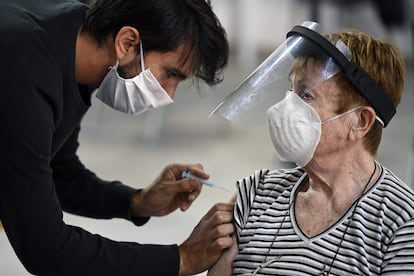A tale of immuno-privilege
While the United States has fully vaccinated 26% of its population, this figure is only 2% in Argentina and 4% in Brazil

We are immuno-privileged. You might think this adjective is a neologism applicable to bodies vaccinated against Covid-19, but that is not quite it. We were already immuno-privileged before, when we started working from home and did not sink into poverty from losing our income, when we were not frontline workers providing care during the pandemic, or simply when we did not catch the coronavirus because we were living in the halfway world of social isolation. And now that we are vaccinated, we have added another layer of privilege to the term. As documented Latin American women living in the United States, we received the vaccine before our elderly parents in Argentina and Brazil.
We feel a dual sense of unease and relief because we are bodies rendered immuno-privileged by life’s inequalities. While it is true that every privilege is a form of immunization, not every immunization comes in the form of a vaccine. Being a man in a patriarchal society is a form of immunization for misogyny, just as being a white body offers immunization against police violence. The vaccine merely makes a product out of what our bodies had already experienced as privilege, naturalized by the policies of life. And like all products, there are disputes over access, control, and distribution. While 26% of the US population has already been fully vaccinated (that is, received all required doses), Argentina has only immunized about 2% of its population and Brazil has reached only 4%. Haiti, the poorest country in the Americas and the Caribbean, has not even begun its vaccination drive. To date, less than 2% of all Covid-19 vaccines administered worldwide have been distributed on the African continent, which is home to 16% of the world’s population.
It is obvious that unequal vaccine distribution has global consequences since it allows new variants to emerge and thus means even the vaccinated may be infected
Here are the geopolitics of immuno-privilege: by early April, 87% of administered vaccines had gone to inhabitants of high- or middle-income countries, whereas only 0.2% had been administered in low-income countries. If global vaccination rates remain at these levels, it will take four to five years to reach herd immunity – that is, full vaccination of 70% to 85% of the population. It is readily obvious that unequal vaccine distribution has immediate global consequences since it allows new variants to emerge and thus means even the vaccinated may be infected. But from the other ways we experience privilege, we know that addressing inequality does not mesh well with distributive policies, and countries will begin disputing these products. Hoarding becomes a way to exercise control, and selfish nationalism takes the reins in negotiations between countries.
Wealthy countries have secured vaccine reserves well beyond what is needed to vaccinate their populations. Vaccine development was contingent on this surplus because no vaccine could have been developed this quickly without government investment. But rather than negotiating intellectual property agreements to facilitate equitable vaccine access for middle-income countries with production capability, the governments of rich nations have opted to guarantee their own surplus, under the mattress. Save your own people first, and then think about others. In keeping with this logic, the United States has donated doses to Mexico and Canada, while China is negotiating with Brazil.
Countries are concerned about their own borders or their own trade agendas – about folks whose access to this immuno-privilege matters not because of the genteel values of dignity or right to life, but rather because they are trade partners or political allies. From this twisted perspective of who gets immunized and who is left to die, we find ourselves as privileged bodies not because of who we are, but as the lawful inhabitants of a territory that is not our homeland. Sad to say, there is no way we can distribute our immuno-privilege; it becomes inalienable individual property. This is yet another piece of property for bodies who have survived thanks to privilege and are now privileged because of something we had not seen as property: legitimately and temporarily inhabiting a country that hoards vaccines.
Debora Diniz is a Brazilian anthropologist and researcher at Brown University.
Giselle Carino is an Argentinian political scientist and IPPF/WHR director.
Tu suscripción se está usando en otro dispositivo
¿Quieres añadir otro usuario a tu suscripción?
Si continúas leyendo en este dispositivo, no se podrá leer en el otro.
FlechaTu suscripción se está usando en otro dispositivo y solo puedes acceder a EL PAÍS desde un dispositivo a la vez.
Si quieres compartir tu cuenta, cambia tu suscripción a la modalidad Premium, así podrás añadir otro usuario. Cada uno accederá con su propia cuenta de email, lo que os permitirá personalizar vuestra experiencia en EL PAÍS.
¿Tienes una suscripción de empresa? Accede aquí para contratar más cuentas.
En el caso de no saber quién está usando tu cuenta, te recomendamos cambiar tu contraseña aquí.
Si decides continuar compartiendo tu cuenta, este mensaje se mostrará en tu dispositivo y en el de la otra persona que está usando tu cuenta de forma indefinida, afectando a tu experiencia de lectura. Puedes consultar aquí los términos y condiciones de la suscripción digital.








































